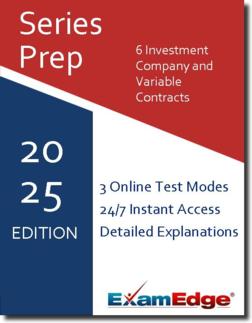Series 6 Investment Company and Variable Contracts (Series6 ) Practice Tests & Test Prep by Exam Edge - FAQ
Based on 22 Reviews
- Real Exam Simulation: Timed questions and matching content build comfort for your Series 6 Investment Company and Variable Contracts test day.
- Instant, 24/7 Access: Web-based Series 6 Invest Company Variable Contracts Exam practice exams with no software needed.
- Clear Explanations: Step-by-step answers and explanations for your Series exam to strengthen understanding.
- Boosted Confidence: Reduces anxiety and improves test-taking skills to ace your Series 6 Invest Company Variable Contracts Exam (Series6 ).

Why should I use Exam Edge to prepare for the Series 6 Invest Company Variable Contracts Exam Exam?
FAQ's for Exam Edge Series 6 Invest Company Variable Contracts Exam practice tests
- Comprehensive content: Exam Edge's Series 6 Invest Company Variable Contracts Exam practice tests are created specifically to prepare you for the real exam. All our Series 6 Investment Company and Variable Contracts practice test questions parallel the topics covered on the real test. The topics themselves are covered in the same proportions as the real test too, based on outlines provided by the Financial Industry Regulatory Authority in their Series 6 Investment Company and Variable Contracts test guidelines.
- Realistic practice: Our Series 6 Investment Company and Variable Contracts practice exams are designed to help familiarize you with the real test. With the same time limits as the real exam, Our FINRA practice tests enable you to practice your pacing and time management ahead of test day.
- Detailed explanations: As you complete your practice tests, we show you which questions you answered correctly and which ones you answered incorrectly, in addition to providing you with detailed step-by-step explanations for every single Series 6 Invest Company Variable Contracts Exam practice exam question.
- Performance insights: After you complete a practice test, we provide you with your raw score (how many you answered correctly) and our estimate of the Series 6 Investment Company and Variable Contracts score you would have received if you had taken the real test.
- Ease of access: Because all Our FINRA practice tests are web-based, there is no software to install. You can take Series 6 Investment Company and Variable Contracts practice exams on any device with access to the internet, at any time.
- Flexible use: If you must pause while taking one of Our FINRA practice exam, you can continue right where you left off. When you continue the test, you will start exactly where you were, and with the same amount of time you had remaining.
- Thousands of unique questions: We offer 10 different online practice exams with 1,000 unique questions to help you prepare for your Series 6 Invest Company Variable Contracts Exam !
- Low cost: The cost of ordering 5 practice tests is less than the cost of taking the real Series 6 Investment Company and Variable Contracts test. In other words, it would be less expensive to order 5 practice tests than to retake the real Series 6 Invest Company Variable Contracts Exam exam!
- Our trusted reputation: As a fully accredited member of the Better Business Bureau, we uphold the highest level of business standards. You can rest assured that we maintain all of the BBB Standards for Trust.
- Additional support: If you need additional help, we offer specialized tutoring. Our tutors are trained to help prepare you for success on the Series 6 Invest Company Variable Contracts Exam exam.
What score do I need to pass the Series 6 Investment Company and Variable Contracts Exam?
To pass the Series 6 Invest Company Variable Contracts Exam test you need a score of 70.
The range of possible scores is 0 to 100.
How do I know the practice tests are reflective of the actual Series 6 Invest Company Variable Contracts Exam ?
At Exam Edge, we are proud to invest time and effort to make sure that Our FINRA practice tests are as realistic as possible. Our practice tests help you prepare by replicating key qualities of the real test, including:
- The topics covered
- The level of difficulty
- The maximum time-limit
- The look and feel of navigating the exam
Do you offer practice tests for other Financial Industry Regulatory Authority subjects?
Yes! We offer practice tests for 5 different exam subjects, and there are 35 unique exams utilizing 3300 practice exam questions. Every subject has a free sample practice test you can try too!
Series 6 Invest Company Variable Contracts Exam (Series6 )
Practice Tests
Series 63 Uniform Securities Agent State Law Exam (Series63)
Practice Tests
Series 65 RIA (Series65)
Practice Tests
Series 66 NASAA Uniform Combined State Law Examination (Series66)
Practice Tests
Series 7 General Securities Representative Exam (Series7 )
Practice Tests
To order tests, or take a sample test, for a different subject:
Click on ' Name on the Exam Name' You will be take to the orders page
How do I register for the real Financial Industry Regulatory Authority?
For up-to-date information about registration for the Financial Industry Regulatory Authority, refer to the Financial Industry Regulatory Authority website.


